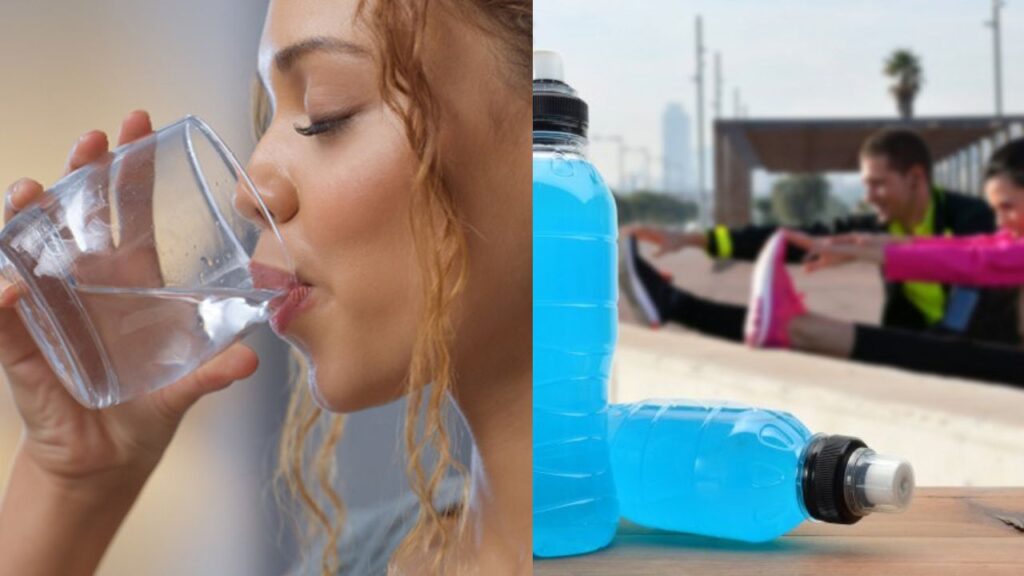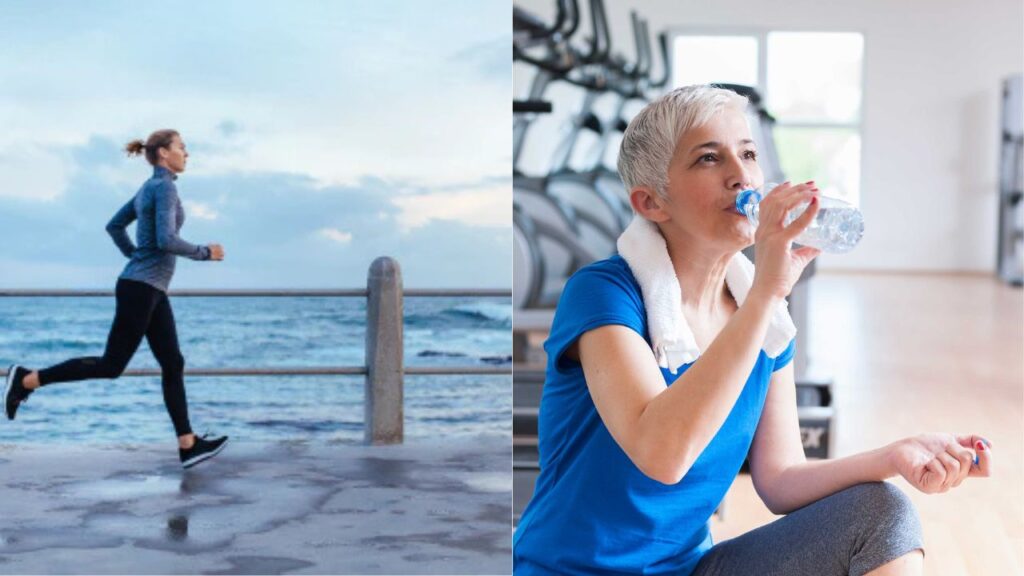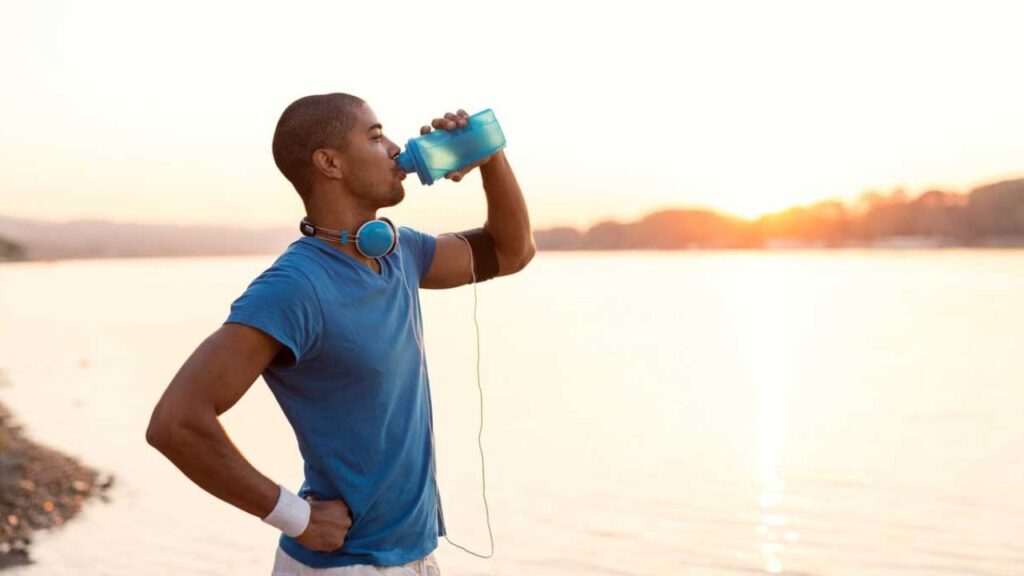Exercising has been an important aspect of everyone’s lives. Gyms and normal workouts are vital to a healthy lifestyle. People who choose to do it can make a significant difference while exercising. However, doing exercise does not work, staying hydrated and energised during your workout is crucial for maximising performance and ensuring safety. While hitting the gym, running, cycling, or playing sports. Proper hydration can help maintain stamina, support muscle function, and prevent fatigue.
Whether someone is engaging in high-intensity training or a low-impact workout, what they drink and when they drink it can significantly impact their performance and post-exercise hydration. While water remains the most essential source of hydration, there are other beverages that can be consumed during a workout to enhance endurance and strength. Options such as sports drinks or even unconventional choices like pickle juice may offer various benefits depending on the workout’s intensity and environmental conditions.
Kelly Jones, RD, a performance dietitian for athletes and busy, active adults. She believes most people will not be able to keep up with fluid losses during moderate to high-intensity exercise, hydrating during activity helps reduce your losses and support hydration for the rest of your day. However, drinking four liters of water and some other drinks will surely keep the body engaged and fresh for work and other activities.
In the article we dive into the best drinks people can have during the workout to keep someone hydrated and energised. We break down the various beverages to consider when deciding what to drink during a workout, plus the ideal situations to have them.
Here are the drinks to have to stay hydrated and energised

6.BCAAs: Branched-Chain Amino Acids for Muscle Support
BCAAs, or branched-chain amino acids (leucine, isoleucine, and valine), are necessary amino acids that can be ingested during exercise to help minimise muscular fatigue and soreness. BCAA supplements are popular among athletes and fitness enthusiasts who perform rigors, strength-based training.
These amino acids not only prevent muscle breakdown but also boost protein synthesis, making them ideal for extended workouts or bodybuilding routines. Helps to reduce delayed onset muscular soreness (DOMS). Provides the necessary building blocks for muscle healing. Delays muscular tiredness, helping you to push through hard situations
5. Chocolate Milk: Post-Workout Recovery Drink
Chocolate might not be the best thing to drink during the time of workout. It contains fat and is heavier. This can slow absorption and may make the person feel weighed down. However, it is a viable (and far more appealing) choice to explore the following exercise. This is because chocolate milk has an ideal carbohydrate-protein ratio, which benefits muscle rehabilitation and glycogen replenishment after severe activity.
4. Pickle Juice Power: An Unlikely Ally in Endurance Training
Some athletes swear by a drink or two to avoid or reduce muscle cramps, especially during endurance sports such as marathons or long rides. However, experts believe pickle juice is not an effective choice for everyone.
More research is needed to determine how good it is as a sports performance beverage—but it rarely hurts to try. If an individual is an endurance athlete or engages in high-intensity activities that result in significant salt loss through perspiration, a few sips of pickle juice may provide aid.
3. Coconut Water: Is The Ultimate Sports Drink Substitute
Coconut water has become a popular alternative to typical sports drinks since it contains less sugar and calories than many electrolyte beverages, making it an excellent choice for anyone looking to replenish electrolytes during moderate exercise without adding a lot of sugar to their diet. It is an excellent choice for a low-calorie, low-sugar drink during exercise while also providing electrolyte replacement.
2. Sports Drinks: Power Up with Essential Electrolyte
Sports drinks and other electrolyte-infused beverages are intended for longer or more strenuous workouts that lead you to sweat profusely, as they contain not only water but also electrolytes such as sodium, potassium, and magnesium. These drinks can help restore electrolytes lost through sweat, so preserving muscle function and lowering the risk of cramping. Sports drinks might help people avoid electrolyte imbalances during exercise in hot or humid environments.
“People who do high-intensity workouts like cycling and running for longer than 45–60 minutes can benefit from using sports drinks no matter what the temperature,” O’Neill says. “For those people that tend to be saltier sweaters, they may benefit from using a sports drink or electrolyte powder even when workouts last less than 60 minutes and/or they’re exercising at a moderate temperature.”
1. Water: The Classic Choice
Water is the most commonly recommended hydration option for most workouts, especially those that last 60 minutes or less and are low to moderate in intensity. And with good reason: Water quickly restores lost fluids without introducing excessive sugar or artificial chemicals into your body.
When exercising in cool surroundings where you do not sweat significantly, water works effectively to avoid dehydration without overloading your body. Water is usually sufficient for staying hydrated, especially if you don’t sweat much.
Tips for effective workout hydration

4. Unlocking the Key to Personalized Hydration
Sweating rates can vary from 0.5 to 2 liters per hour, depending on factors such as heredity, temperature, adaptation to the environment, clothing, altitude, and more. Those who know they sweat more than others may need to hydrate more. Paying attention to the body’s cues, as well as perspiration and thirst levels during and after exercise, allows for adjustments in fluid intake.
More precision can be achieved by calculating individual sweat rates, which becomes particularly important for longer workouts. Sodium sweat losses have been found to range between 200 and 2,000 milligrams per liter of sweat. This means that replenishing sodium during exercise for hydration can be essential for some individuals to maintain fluid balance.
3. Environment
Climate matters. The hotter it gets, the more people need to hydrate. Since they will sweat more than they would in cooler weather. “When exercising in the heat, especially when not acclimated, pre-exercise hydration strategies are important to consider,” according to Jones.
Hydration is especially important during a hot-weather workout. Aim to drink 200-300 milliliters (or 7-8 ounces) of water every 15 minutes. When exercising in high heat or humidity, electrolyte-replenishment drinks might help you stay hydrated.
2. Hydration Needs for Intense Workouts
Are they going for a stroll, or are they participating in a hilly cycling course or a race? The later workouts typically produce more sweat, necessitating the replenishment of lost fluids. According to O’Neill, marathon runners may benefit from drinking 0.4-0.8 liters (about 12-24 ounces) of fluid per hour. However, if you’re going for a simple 20-minute walk, simply following your body’s natural hydration cues will usually suffice.
1. Hydration Strategies for Every Workout Length
The length of a sweat session plays a significant role in determining how much fluid one should drink while exercising. However, this remains highly variable depending on the individual and the workout conditions.
O’Neill states, that fluid needs vary based on each individual. Most people tolerate smaller amounts consumed more frequently instead of larger amounts all at once. It’s best to meet these goals by taking a few sips every couple of minutes rather than drinking it all at once.
The Hydration Equation: Balance and Performance

Hydration during a workout is crucial for improving performance, minimising weariness, and avoiding dehydration. For most workouts lasting an hour or less, water is usually more than enough to keep people hydrated while also allowing them to perform at their best.
If they are doing longer, sweatier workouts that require replenishment during the activity, it may be useful for them to experiment with several beverage options to find the ones that assist them stay in top condition during and after the workout.


